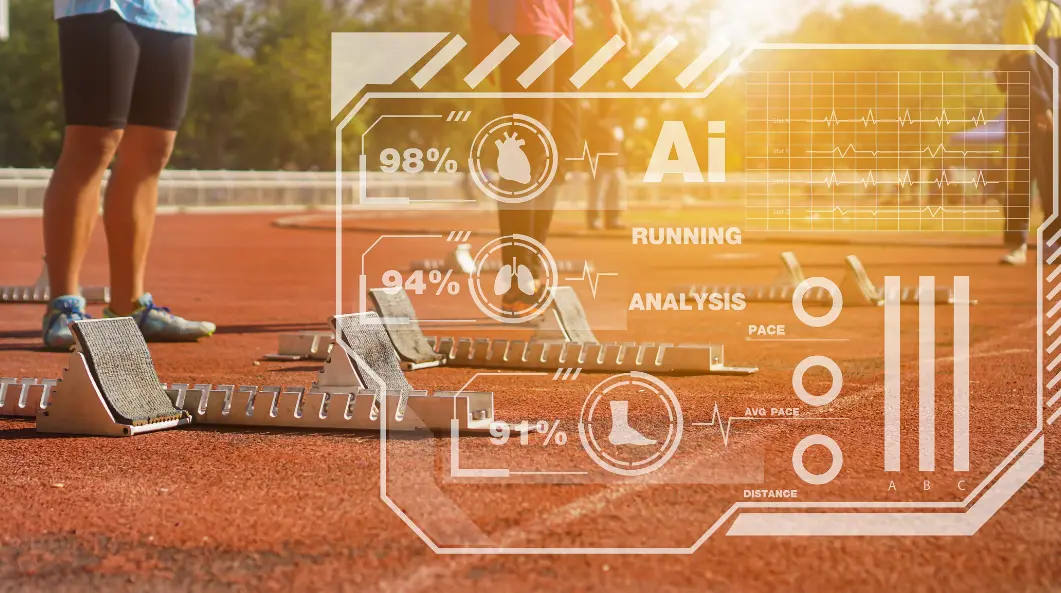AI in Sports Analytics: Boosting Performance & Strategy

Table of content
1. Understanding AI in Sports
2. The Role of Data Analytics
3. Applications of AI in Sports
4. Other Applications in Sports
5. Use Cases and Real-World Examples
6. Challenges and Ethical Considerations
7. The Future of AI in Sports
8. Pangaeax: Revolutionizing Hiring in Sports and Business
9. Conclusion
Sports analytics has evolved dramatically over the years, with AI revolutionizing the way teams, coaches, and analysts make decisions. From optimizing player performance to improving fan engagement, AI is at the forefront of transforming sports. Imagine a soccer team using AI-driven insights to predict their opponent’s next move or a coach leveraging real-time data to adjust game strategies instantly. AI in sports analytics is no longer just a futuristic concept; it is reshaping the industry in real time.
Understanding AI in Sports
Artificial Intelligence (AI) in sports refers to the application of machine learning, predictive modeling, and data-driven decision-making to enhance the performance of athletes, improve game strategies, and elevate fan experiences. AI is used for collecting and analyzing vast amounts of sports data, enabling teams and organizations to make informed decisions. Whether it’s player scouting, game strategy, or injury prevention, AI is transforming how sports are played and managed at all levels.
The Role of Data Analytics
Data analytics is the backbone of AI in sports. By leveraging big data, AI systems can analyze trends, predict outcomes, and provide actionable insights that help players and coaches refine their strategies.
Data Collection and Management
- Integration with IoT: AI compiles data from IoT sensors to create a holistic performance analysis.
- Big Data Handling: AI processes enormous sports datasets to derive actionable insights.
Data Visualization
- Real-Time Stats: AI creates interactive dashboards to display live game analytics.
- Statistical Modeling: AI formulates predictive metrics for player and team assessments.
AI-Driven Video Analytics
AI-driven video analysis enables teams and organizations to review matches more efficiently, detect key moments, and improve game tactics through detailed breakdowns of play patterns.
- Automated Game Footage Analysis: AI reviews match footage to extract key tactical patterns and player movement insights.
- Refined Performance Review: AI allows teams to conduct efficient, detailed post-game analysis.
Applications of AI in Sports
Performance Optimization
AI is revolutionizing athlete performance by offering data-driven insights that help in training, injury prevention, and in-game decision-making.
ng. By analyzing player movements, biometric data, and game performance, AI provides precise recommendations tailored to each athlete’s needs.
Player Performance Analysis
- Customized Training Programs: AI tailors training modules based on biomechanics, past performance, and predictive analysis, ensuring individualized athlete development.
- Injury Prediction & Prevention: AI assesses player movement patterns and detects potential injury risks, allowing for preemptive interventions.
Real-Time Decision Support
- On-the-Fly Strategy Adjustments: AI assists coaches with in-game tactical changes based on live data.
- Wearable AI Technology: AI-integrated wearables track an athlete’s vitals and biomechanics, providing real-time performance insights.
Strategic Game Enhancement
AI plays a vital role in shaping game strategies, opponent analysis, and real-time play adjustments. With AI, teams can analyze past game data, predict opponent moves, and make smarter strategic decisions during matches.
Game Strategy
- Opponent Analysis: AI studies past performance data to predict an opponent’s strategy and weak points.
- Dynamic Play Adjustments: AI dynamically modifies team formations and tactics during the game.
Scouting and Recruitment
- Global Talent Search: AI evaluates a vast array of player data to identify promising talent worldwide.
- Automated Player Profiling: AI analyzes video footage and performance stats to rank athletes based on skill level.
Fan Engagement
Beyond performance analytics, AI is enhancing fan experiences by providing personalized content, interactive engagements, and smarter entertainment options.
Personalized Content
- AI-Generated Highlights: AI curates game highlights based on fan preferences.
- AI-Powered Chatbots: AI-driven chatbots engage fans with real-time game insights and Q&A sessions.
Augmented Reality & Fantasy Sports
- AI and AR Integration: AI enhances sports viewing through AR overlays featuring real-time statistics.
- Fantasy Sports Optimization: AI refines fantasy league predictions with in-depth player performance analytics.
Other Applications in Sports
AI’s capabilities extend beyond just team performance and fan engagement. It is also being utilized in coaching, officiating, and even sports betting, making it an indispensable part of the sports ecosystem.
AI in Coaching
- AI as an Automated Coach: AI provides immediate tactical guidance and performance feedback.
- VR Training Simulations: AI-powered VR environments enable immersive athlete training.
AI for Referees
- Automated Officiating: AI improves refereeing accuracy and ensures unbiased game decisions.
- VAR and AI Integration: AI refines video assistant referee (VAR) technology for more precise rulings.
Sports Betting
- AI in Predictive Betting: AI refines odds-setting using deep predictive modeling.
- Fraud Detection in Betting: AI detects anomalies to prevent fraudulent activities in sports betting.
Use Cases and Real-World Examples
AI has already been successfully integrated into various sports domains, demonstrating its transformative potential. From injury prevention to advanced game analysis, AI continues to shape the future of sports.
Injury Prevention and Health Monitoring
Athletes undergo intense training regimens that push their physical limits, increasing the risk of injuries. AI plays a crucial role in monitoring player workloads and detecting early signs of strain.
- Example: AI-driven workload management helps professional teams reduce injury occurrences by analyzing movement patterns, muscle fatigue, and exertion levels.
- AI-powered predictive models assess injury risks based on past performance data, helping coaches modify training intensity to prevent overexertion.
- Wearable AI devices track biomechanics and vitals in real time, alerting medical teams to potential injuries before they escalate.
Match Analysis and Umpiring
Ensuring fair play and accurate officiating is vital in competitive sports. AI technology enhances the precision of officiating decisions and post-match analysis.
- Example: AI-powered Hawk-Eye technology improves decision accuracy in cricket and tennis by providing real-time ball tracking and virtual replays.
- Computer vision AI assists referees by reviewing controversial calls, reducing human error and increasing game fairness.
- Automated video analysis systems break down plays, providing teams with insights into performance trends and opponent tactics.
Team Strategy Development
AI is transforming how teams develop and adjust their strategies, making data-driven decisions more effective than ever.
- Example: AI-led play-calling systems have helped sports teams achieve tactical success by analyzing real-time match data and suggesting optimal plays.
- Machine learning algorithms predict an opponent’s next move, allowing coaches to make proactive adjustments.
- AI-driven simulations create virtual match scenarios, enabling teams to test and refine their strategies before a game.
Challenges and Ethical Considerations
Despite its benefits, AI in sports also raises some ethical concerns, particularly regarding data privacy and adoption challenges.
Data Privacy & Bias
AI’s reliance on personal data raises significant privacy concerns and potential biases in decision-making.
- Collecting and analyzing vast amounts of biometric and performance data increases risks related to unauthorized access and misuse.
- AI models may inherit biases from historical data, leading to unfair evaluations of athletes based on incomplete or skewed datasets.
Integration & Adoption
The implementation of AI across various sports levels presents financial and technological challenges.
- Many lower-tier teams and grassroots organizations may struggle to afford the advanced AI infrastructure needed for analytics.
- Coaches and players require proper training to interpret AI-driven insights effectively, creating a learning curve for adoption.
- Resistance to change from traditionalists in the sports industry can slow down AI integration, making widespread adoption a gradual process.
The Future of AI in Sports
As AI technology continues to evolve, its applications in sports will only grow. Future developments could include AI-driven sportswear, AI-powered training robots, and even AI-based virtual sports leagues.
- Predictions: AI-led smart sportswear, AI-enhanced training robots, and virtual AI-powered sports leagues.
- Impact: AI is democratizing advanced sports analytics, making it accessible for amateur athletes and smaller teams.
Pangaeax: Revolutionizing Hiring in Sports and Business
Pangaeax is redefining how sports organizations and businesses hire freelance professionals. Utilizing AI-driven talent matching, Pangaeax connects teams with expert freelance data analysts, and strategists ensuring they have access to top-tier expertise.
How Pangaeax Helps Sports Organizations
- Global Access to Experts: Enables teams to hire specialists in AI analytics, sports science, and performance optimization from anywhere in the world.
- Streamlined Recruitment Process: Reduces hiring time and administrative efforts, allowing organizations to focus on performance and strategy.
- Optimized Workflow: Ensures seamless collaboration between teams and freelance professionals through integrated project management tools.
By leveraging platforms like Pangaea X sports organizations can stay competitive, embrace AI-driven strategies, and access elite analytical talent without the constraints of traditional hiring processes.
Conclusion
AI is transforming sports analytics, enhancing player performance, refining game strategies, and elevating fan experiences. From real-time decision-making to injury prevention and data-driven scouting, AI’s influence continues to reshape the sports industry. As AI technology advances, its role in sports will expand further, unlocking new possibilities for teams, athletes, and fans alike. Platforms like Pangaea X are also making it easier for sports organizations to hire expert freelance analysts, strategists, and AI specialists, ensuring they stay ahead in the competitive landscape.
Get your data results fast and accelerate your business performance with the insights you need today.



